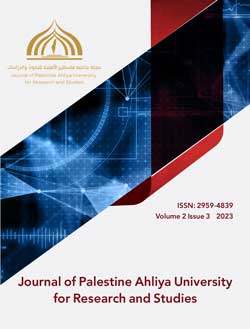The Impact of HRM Practices and Leadership Styles on Administrative-Office Staff Performance in Palestinian Universities
DOI:
https://doi.org/10.59994/pau.2023.3.54Keywords:
HRM practices, Transformational leader, Transactional leader, In-role performance, Extra-role performanceAbstract
This study investigates the impact of HRM practices and leadership styles on administrative-office staff performance in traditional universities and university colleges in Palestine. A pilot study was conducted before data collection to check content validity and reliability, which was successfully achieved. The primary data were collected through questionnaires distributed to a purposive sample of administrative-office employees from nine Palestinian universities and university colleges across the West Bank area. A total of 256 questionnaires out of 270 were eligible for data analysis. The response rate was 0.94. The data analysis was carried out using SPSS version 24 utilizing the data analysis program: PLS-SEM version 3. The findings of this research study have reported that HRM practices (training and development, compensation and rewards, employee relations, and performance appraisal) are positively related to administrative-office staff performance. In contrast, leadership styles (transformational and transactional) were found to have no significant impact on administrative-office staff performance. The study's contribution is threefold: the "population gap" contribution, HRM Practices' theoretical-practical gap contribution, and leadership styles' theoretical-practical gap contribution, besides its practical significance. The study has reached several recommendations, the most important of which are the examined HRM practices should be reinforced and emphasized in order to increase administrative-office staff performance and boost their effectiveness and in case of future examination of the relationship between leadership styles and employee performance, the researchers may employ a mediator or focus on investigating different styles of leadership other than transformational and transactional.
Downloads
References
Abu-Mahfouz, S. S. (2019). TQM practices and organizational performance in the manufacturing sector in Jordan mediating role of HRM practices and innovation. Journal of Management and Operation Research, 1(22), 1-12.
Ahn, J., & Rho, T. (2021). The effect of customer participation in service industry on encounter satisfaction by the development of relationship. Journal of global scholars of marketing science, 31(1), 94-120.
Ajouz, M. A., & Abuamria, F. M. (2021). Does Mobile Payment Promote Financial Inclusion Among Palestinians Women: A Quantitative Approach Through Structural Equation Modeling. Journal of Islamic Finance, 10(2), 67-78.
Ajouz, M., Salhab, A., & Idais, A. (2020). Factors Influencing the Potential User's Acceptance of Rocab Mobile Application for Public Transportation in Palestine: Insights from Innovation Diffusion Theory and Technology Acceptance Model. Management & Economics Research Journal, 2(5), 1-20.
Al Khajeh, E. H. (2018). Impact of leadership styles on organizational performance. Journal of Human Resources Management Research, 1-10.
AlNuaimi, B. K., Singh, S. K., & Harney, B. (2021). Unpacking the role of innovation capability: Exploring the impact of leadership style on green procurement via a natural resource-based perspective. Journal of business research, 134, 78-88.
Alomary, L., AlShrouf, H., & Ajouz, M. (2023). Factors Influencing Female Student Participation in Student Council Elections at Palestinian Universities: An Application of the Theory of Planned Behavior. Journal of Palestine Ahliya University for Research and Studies, 2(1), 28–59.
Al Zeer, I., Ajouz, M., & Salahat, M. (2023). Conceptual model of predicting employee performance through the mediating role of employee engagement and empowerment. International Journal of Educational Management, 37(5), 986-1004.
Amitay, M., Popper, M., & Lipshitz, R. (2005). Leadership styles and organizational learning in community clinics. The Learning Organization, 12(1), 57-70.
Baig, S. A., Iqbal, S., Abrar, M., Baig, I. A., Amjad, F., Zia-ur-Rehman, M., & Awan, M. U. (2021). Impact of leadership styles on employees’ performance with moderating role of positive psychological capital. Total Quality Management & Business Excellence, 32(9-10), 1085-1105.
Barney, J. B. (2001). Resource-based theories of competitive advantage: A ten-year retrospective on the resource-based view. Journal of management, 27(6), 643-650.
Buller, P. F., & McEvoy, G. M. (2012). Strategy, human resource management and performance: Sharpening line of sight. Human resource management review, 22(1), 43-56.
Chieng, H. P., Arokiasamy, L., & Kassim, K. A. A. (2019). Human resource management practices and their impact on construction organizational performance. Global Business and Management Research, 11(1), 392-406.
Cortellazzo, L., Bruni, E., & Zampieri, R. (2019). The role of leadership in a digitalized world: A review. Frontiers in Psychology, 10, 1-21.
Dakhoul, Z. M. (2018). The determinants of employee performance in Jordanian organizations. Journal of Economics Finance and Accounting, 5(1), 137-143.
Easa, N. F., & Orra, H. E. (2021). HRM practices and innovation: An empirical systematic review. International Journal of Disruptive Innovation in Government, 1(1), 15-35.
Emery, C. R., & Barker, K. J. (2007). The effect of transactional and transformational leadership styles on the organizational commitment and job satisfaction of customer contact personnel. Journal of organizational culture, communications and conflict, 11(1), 1-6.
Erwin, S., Rahmat, S. T. Y., Angga, N. D., & Semerdanta, P. (2019). Transformational leadership style and work life balance: The effect on employee satisfaction through employee engagement. Russian Journal of Agricultural and Socio-Economic Sciences, 91(7), 310-318.
Fornell, C., & Larcker, D. F. (1981). Structural equation models with unobservable variables and measurement error: Algebra and statistics. Journal of marketing research, 18, 382-388.
Gandolfi, F., & Stone, S. (2018). Leadership, leadership styles, and servant leadership. Journal of Management Research, 18(4), 261-269.
Hair, J. F., Black, W. C., Babin, B. J., & Anderson, R. E. (2010). Multivariate data analysis: A global perspective (7th ed.). USA, Pearson Prentice Hall.
Ichsan, R. N., Nasution, L., Sinaga, S., & Marwan, D. (2021). The influence of leadership styles, organizational changes on employee performance with an environment work as an intervening variable at pt. Bank sumut binjai branch. Journal of Contemporary Issues in Business and Government, 27(2), 133-143.
Karoso, S., Riinawati, R., Ilham, R. N., Rais, R. G. P., & Latifa, D. (2022). Analyzing the Relationship of Work Environment and Quality of Work Life on Employee Performance: The Mediating Role of Organizational Commitment. Journal of Madani Society, 1(3), 167-173.
Lim, C. T., & Ahmad, N. (2021). The relationship between human resource management practices and employee performance. Research in Management of Technology and Business, 2(1), 123-136.
Liu, C., Liu, S., Yang, S., & Wu, H. (2019). Association between transformational leadership and occupational burnout and the mediating effects of psychological empowerment in this relationship among CDC employees: a cross-sectional study. Psychology research and behavior management, 12, 437-446.
Maamari, B. E., & Saheb, A. (2018). How organizational culture and leadership style affect employees’ performance of genders. International Journal of Organizational Analysis, 26(4), 630-651.
Manzoor, F., Wei, L., Bányai, T., Nurunnabi, M., & Subhan, Q. A. (2019). An examination of sustainable HRM practices on job performance: An application of training as a moderator. Sustainability, 11(8), 2263.
Mira, M., Choong, Y., & Thim, C. (2019). The effect of HRM practices and employees’ job satisfaction on employee performance. Management Science Letters, 9(6), 771-786.
Nadim, A., & Singh, P. (2019). Leading change for success: embracing resistance. European business review, 31(4), 512-523.
Nguyen, D., Harris, A., & Ng, D. (2020). A review of the empirical research on teacher leadership (2003–2017) Evidence, patterns and implications. Journal of educational administration, 58(1), 60-80.
Ohemeng, F. L., Amoako-Asiedu, E., & Darko, T. O. (2018). The relationship between leadership style and employee performance: An exploratory study of the Ghanaian public service. International Journal of Public Leadership, 14(4), 274-296.
Omuya, M. (2018). The Influence of Compensation and Rewards on employee performance in public universities in Kenya. International Journal of Economics, Commerce and Management United Kingdom, 6(3), 700-736.
Salahat, M. A. (2017). HRM practices, leadership styles and customer satisfaction: mediating role of employee performance. [Unpublished doctoral thesis], Universiti Utara Malaysia, Malaysia.
Salahat, M. A. (2021a). Improving Customer Responsiveness Agility Through Leadership Styles; Mediating Role of Employee Empowerment. Australian Journal of Basic and Applied Sciences, 15(11), 1-11.
Salahat, M. A. (2021b). Employee Empowerment, Knowledge Management and Decision-making Agility; Mediating Role of Extra-role Performance. International Journal of Academic Research in Business and Social Sciences, 11(7), 960-977.
Salahat, M., & Abdul Majid, A. H. (2017). Does in-role performance mediate the relationships between performance appraisal, internal communication and customer satisfaction. Journal of Research in Business, Economics and Management (JRBEM), 8(2), 1381-1393.
Salahat, M., & Halim, A. (2016). The effect of Career Planning and Recruitment and selection on Customer Satisfaction: Mediating role of Extra-role Performance; evidence from Palestine. Australian Journal of Basic and Applied Sciences, 10(16), 292-304.
Salahat, M. A., & Majid, A. (2016). Linking leadership styles to customer satisfaction of Palestinian insurance sector: Mediating role of employees’ performance. International Journal of Advanced and Applied Sciences, 3(11), 73-82.
Siangchokyoo, N., Klinger, R. L., & Campion, E. D. (2020). Follower transformation as the linchpin of transformational leadership theory: A systematic review and future research agenda. The Leadership Quarterly, 31(1), 1-18.
Utin, N. H., & Yosepha, S. Y. (2019). The model of employee performance. International Review of Management and Marketing, 9(3), 69-73.
Wahyuni, N. P. D., Purwandari, D. A., & Syah, T. Y. R. (2020). Transactional leadership, motivation and employee performance. Journal of Multidisciplinary Academic, 3(5), 156-161.

Downloads
Published
How to Cite
Issue
Section
License
Copyright (c) 2023 Journal of Palestine Ahliya University for Research and Studies

This work is licensed under a Creative Commons Attribution 4.0 International License.
مجلة جامعة فلسطين الاهلية للبحوث والدراسات تعتمد رخصة نَسب المُصنَّف 4.0 دولي (CC BY 4.0)











